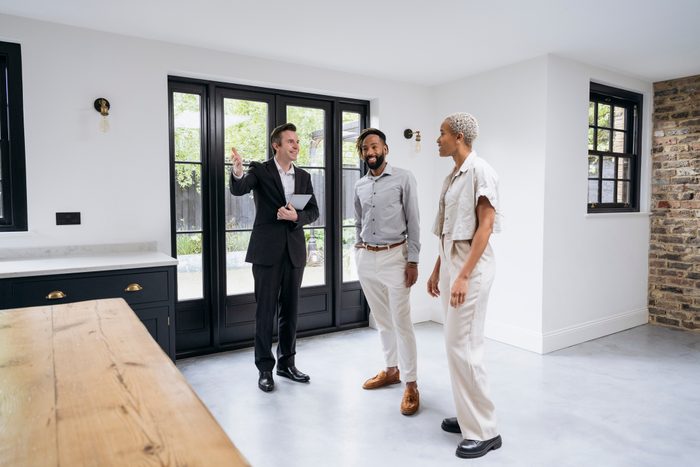5 Terms Real Estate Agents Don’t Use Anymore
Updated: Sep. 15, 2023

After decades of sticking to the status quo, real estate agents are turning to bias-free language in property descriptions.
If you plan to shop for real estate anytime soon, heads up. You might not find a house with a “master” bedroom or “his-and-her” closets.
We’re not suggesting builders and renovators are moving away from larger bedrooms with attached bathrooms and twin closets. They are, however, moving away from something else significant — language traditionally used to describe these spaces in real estate ads.
“People may not realize it when they are casually describing rooms … but some terms can be offensive,” says Beatrice de Jong, consumer trends expert at Opendoor, a digital residential real estate company.
Not only that, she says, the terms may not accurate describe what potential buyers will find when they walk through the doors.
“In my experience,” she says, “a lot of new buyers don’t even know what those old terms mean.” She says it’s always better to use terminology that really shows what a property has to offer, rather than risking offending someone with archaic language.
Here are five terms no longer used in real estate ads.
On This Page
Master Bedroom
Legend has it that the term “master’s bedroom” first showed up in a Sears catalog way back in the 1920s. Though the real estate industry used the phrase “master bedroom” (and its sidekick, “master bathroom”) to denote the home’s main sleeping space for decades, it conjures images of slavery to people of color.
“It is just not appropriate to use that term anymore,” de Jong says.
Because of this, real estate organizations like the Houston Association of Realtors have officially advised against the use of the term in listings.
Does this mean you’ll never see it again? Not necessarily. The United States Department of Housing and Urban Development has yet to reverse its 1989 decision that the term “master bedroom” did not violate fair housing advertising standards. However, use of the word “master” is definitely diminishing industry-wide.
The replacement: Agents are replacing “master bedroom” with “primary bedroom” or “owner’s suite.” That allows them to identify the largest bedroom in the home without referencing one of the nation’s darkest legacies.
His-and-Hers or Jack-and-Jill
Commonly used to describe something that appears in pairs, like closets or sinks or bathrooms, “his-and-hers” and/or “Jack-and-Jill” are not inclusive of everyone’s living situations, de Jong says.
Sure, someone might share a space with their opposite gender spouse. But they also might live with a same-sex spouse or partner, other family members or even roommates. Adding a gender-based qualifier in front of closet, sink or bathroom, etc. can be offensive.
The replacement: If two sinks in the primary suite are a selling point, straightforward descriptions like “dual” or “double” are best.
Bachelor Pad
Always steer clear of property descriptions that describe the potential buyer, says Ashlee Mecham, a principal broker with Berkshire Hathaway Real Estate Professionals. That’s why “bachelor pad,” besides being dated, is problematic — it suggests the property is meant for a single man.
However, only the buyer can decide whether a property meets their needs. Instead, Mecham and de Jong say, it’s better to just use descriptive, gender-neutral adjectives so folks know whether a particular space has the features they want or need.
The replacement: Historically, people have used “bachelor pad” to describe smaller spaces that might appeal to someone living alone, de Jong says. With that in mind, words like cozy or quaint are more appropriate and more helpful.
Mother-in-Law or Granny Unit
You don’t have to be a widowed grandmother to take up residence in a basement apartment or secondary living space on the property but detached from the main house. Therefore, it is unnecessary — and possibly sexist or presumptuous — to put “mother-in-law” or “granny” in a property description. Who’s to say your mother-in-law needs or even wants to bunk with the rest of the family?
Besides, some buyers might have visions of turning the space into a rental unit, home office or guest suite. A living space for Grandma (or Grandpa) is just one option.
The replacement: Today, many agents ditch these passé terms for the official words for these spaces — accessory dwelling units (ADUs) or simply … apartments.
Walking Distance
Walking distance might seem like a benign and clear-cut term. But in real estate property descriptions, it’s actually ambiguous and quite sticky. “Walkable to one person is not walkable to another,” says Mecham.
It also excludes those with mobility challenges, de Jong says. It wrongly implies the home isn’t suitable for them, or that they wouldn’t be interested in nearby attractions.
The replacement: Agents are now indicating how close properties are to area attractions, like schools, shopping or major employers. de Jong favors stating exactly mileage from the property to various places. This, she says, allows the buyer to decide whether the property is in “walking distance” or not.
Is It Legal to Say “Master Bedroom?”
Of course, there is still a chance you’ll encounter property descriptions with outdated or biased language. de Jong urges folks to keep in mind it “does not make them bad people if they still use these terms.” So far, their use is not illegal; “master” is the only one that has prompted widespread action.
Plus, you won’t automatically solve the problem with different words, says Morgan Williams, general counsel for the National Fair Housing Alliance. The key, Williams says, is to look at all the words in context. Sometimes there is nuance in the language that is problematic even without phrases like master bedroom.
